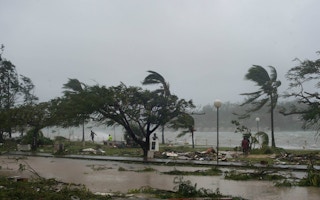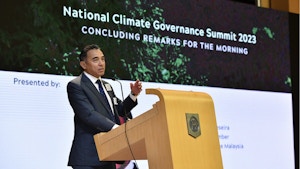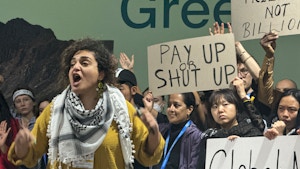The collapse of the fourth United Nations (UN) Transitional committee meeting on loss and damage, held from 17-20 October in Egypt, warranted a fifth meeting on 3 November, before the start of the COP28 climate talks at the end of the month.
Transitional committee meetings have been ongoing throughout the year, which are meant to prepare the details of how to operationalise the fund to address loss and damage impacts from climate change.
The fundamental disagreements between the global south countries and rich nations represented in the 24-seat committee were whether the World Bank will host the fund and whether to limit the eligibility of accessing it to least developing countries, as pushed by the United States and European countries.
During the World Bank and International Monetary Fund annual meetings held in Marrakech, Morocco from 09-15 October, civil society groups from all over the world also denounced the possibility of the World Bank’s key role in the loss and damage fund in the Counter-Summit of Social Movements held 12-15 October in the same city.
World Bank out of the loss and damage fund
Loss and damage has long been a contentious issue in the UN climate talks. Countries in the global south, especially the small-island states and climate-vulnerable countries, have demanded it since the start of the UN Framework Convention on Climate Change in 1991. For three decades, wealthy nations rejected the demands for ‘compensation’ for the consequences of their high share of the planet-heating emissions that are now causing climate catastrophes around the world.
Finally, the wealthy nations relented and an agreement to set up a loss and damage fund was struck at the COP27 climate talks in Sharm el-Sheikh last year. That long-awaited victory of a group of 134 African, Asian and Latin American states and small island nations is an essential step to pay for the huge ecological, environmental, economic and historic damages and losses already being suffered by the global south all these decades. Some damages and losses are beyond repair and communities could no longer adapt to them.
At the previous meeting last month, the United States refused to budge on its proposal for the World Bank to host the loss and damage fund. The US argued it has no particular responsibility to pay for climate loss and damage despite its record of being a historic and huge emitter of greenhouse gases that caused climate change.
During the meeting too, the chair of the Alliance of Small Island States (AOSIS), Diann Black-Layne of Antigua and Barbuda argued that the “World Bank role is being presented as the only option” in the negotiation and because of that the talks could be stopped as it was no longer a negotiation. She further said that the World Bank is a lending institution, while dealing with loss and damage in debt-strapped nations like hers requires grant funding.
The G77 and China group of developing countries would prefer an independent loss and damage fund that can set its own rules, or one housed at a UN agency. Small island states and middle-income developing countries will not be eligible to access the fund, a fact the Pakistani negotiator viewed as unfair and cause for worry as they are not among the world’s poorest nations, despite suffering huge losses in recent years from storms and floods.
The World Bank’s dismal record on climate
Despite its claim in its last annual general meeting that it is transforming into a climate-friendly bank, the impacts of the World Bank’s culture and practices of pushing for loans to global south countries to finance fossil fuel projects would be difficult to undo for a long period.
Hosting the fund would also means the bank’s staff will be the implementor of the fund. Many campaigners on international financial institutions, like myself in the past and current campaigners, know from monitoring the World Bank’s operations that it lacks a ‘climate culture’.
The bank also charges high fees to the funds it hosts. ActionAid has argued in a report that the bank could charge huge hosting fees for the loss and damage fund that could be as high as 24 per cent. That means for example that if the fund holds US$100 billion each year, US$24 billion would go to the bank.
That means less money can be accessed by global south countries which need it most. That amount could go a long way to addressing the needs of millions of people in climate-vulnerable countries.
The business model of the World Bank is notorious for imposing loans and conditionalities to global south countries. World Bank hosting would also mean the fund will be governed by a board that is mostly composed of governments of rich countries, similar to the World Bank’s governance structure. As we already know, that structure is different from the UN wherein countries have equal votes and decisions are arrived at by consensus.
Last-ditch attempt for compromise?
The Transitional committee early this month could be a last-ditch attempt to find compromise and craft a joint proposal for countries to finalise and adopt at COP28, starting on 30 November.
Movements and communities from the global south and allies elsewhere have long been campaigning for an independent, democratically-governed, and non-debt-creating loss and damage fund. If the US’s proposal gets adopted, the global south will further spiral down into more debts.
Governments of rich countries that enriched themselves from their disproportionate history of emitting high levels of greenhouse gasses will only continue earning profits from the climate crisis through more ‘climate loans’ instead of doing their fair share.
If this happens, the loss and damage fund will just be another fund that does not respond to the growing financial needs of the peoples and communities of the global south.
Dorothy Grace Guerrero is Head of Policy and Advocacy of United Kingdom-based nonprofit Global Justice Now. This op-ed was originally written in the Global Justice Now website. Minor edits have been made.















